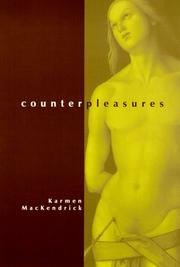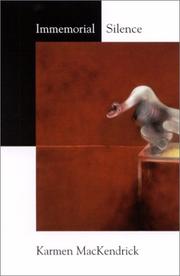| Listing 1 - 10 of 38 | << page >> |
Sort by
|

ISBN: 0791441474 0791441482 Year: 1999 Publisher: Albany State university of New York press
Abstract | Keywords | Export | Availability | Bookmark
 Loading...
Loading...Choose an application
- Reference Manager
- EndNote
- RefWorks (Direct export to RefWorks)
Asceticism. --- Pleasure. --- Sadomasochism. --- Psychoanalyse --- cultuur en religie. --- Asceticism --- Pleasure --- Sadomasochism --- Algolagnia --- Algophilia --- BDSM (Sexual behavior) --- Masochism, Sexual --- S & M (Sadomasochism) --- S and M (Sadomasochism) --- S/M (Sadomasochism) --- Sadism, Sexual --- Sado-masochism --- Sexual masochism --- Sexual sadism --- Ascetical theology --- Contempt of the world --- Theology, Ascetical --- Psychosexual disorders --- Leather lifestyle --- Masochism --- Sadism --- Sexual dominance and submission --- Emotions --- Ethics --- Senses and sensation --- Utilitarianism --- Happiness --- Hedonism --- Christian life

ISBN: 0585062536 9780585062532 0791441474 0791441482 1438411588 Year: 1999 Publisher: Albany, NY : State University of New York Press,
Abstract | Keywords | Export | Availability | Bookmark
 Loading...
Loading...Choose an application
- Reference Manager
- EndNote
- RefWorks (Direct export to RefWorks)
Counterpleasures takes up a series of literary and physical pleasures that do not appear to be pleasurable, ranging from saintly asceticism to Sadean narrative to leathersex. Each is placed in its cultural context to unfold a history of transgressive pleasure and to argue for the value and power of such pleasures as resistant to more totalizing forms of power.
Pleasure. --- Sadomasochism. --- Asceticism. --- Ascetical theology --- Contempt of the world --- Theology, Ascetical --- Christian life --- Ethics --- Algolagnia --- Algophilia --- BDSM (Sexual behavior) --- Masochism, Sexual --- S & M (Sadomasochism) --- S and M (Sadomasochism) --- S/M (Sadomasochism) --- Sadism, Sexual --- Sado-masochism --- Sexual masochism --- Sexual sadism --- Psychosexual disorders --- Leather lifestyle --- Masochism --- Sadism --- Sexual dominance and submission --- Emotions --- Senses and sensation --- Utilitarianism --- Happiness --- Hedonism --- SADOMASOCHISM --- PLEASURE --- ASCETICISM --- PSYCHOLOGY --- PHILOSOPHY --- Sadomasochism --- Pleasure --- Asceticism --- Psychology --- Philosophy

ISBN: 0791491102 0791448770 9780791448779 0791448789 9780791448786 9780791491102 Year: 2001 Publisher: Albany, New York State : State University of New York Press,
Abstract | Keywords | Export | Availability | Bookmark
 Loading...
Loading...Choose an application
- Reference Manager
- EndNote
- RefWorks (Direct export to RefWorks)
"Drawing on philosophy, theology, and literature, from the early Middle Ages to the present, Immemorial Silence traces a series of intertwined ideas. Exploring silence as the absence of language, which is nonetheless inherent in language itself, and eternity as the outside of time, cutting through time itself, the book unfolds a series of connections between these temporal and linguistic themes."--Jacket.
Silence (Philosophy) --- Language and languages --- Time. --- Eternity. --- Time --- Eternity --- Speculative Philosophy --- Philosophy --- Philosophy & Religion --- Infinite --- Future life --- Hours (Time) --- Geodetic astronomy --- Nautical astronomy --- Horology --- Foreign languages --- Languages --- Anthropology --- Communication --- Ethnology --- Information theory --- Meaning (Psychology) --- Philology --- Linguistics --- Philosophy.
Book
ISBN: 143846892X 9781438468921 9781438468914 1438468911 1438468903 Year: 2018 Publisher: Albany, New York : State University of New York Press,
Abstract | Keywords | Export | Availability | Bookmark
 Loading...
Loading...Choose an application
- Reference Manager
- EndNote
- RefWorks (Direct export to RefWorks)
Luckily for human diversity, we are perfectly capable of desiring impossible things. Failing Desire explores a particular set of these impossibilities, those connected to humiliation. These include the failure of autonomy in submission, of inward privacy in confession, of visual modesty in exhibition, and of dignity in playing various roles. Historically, those who find pleasure in these failures range from ancient Cynics through early Christian monks to those now drawn by queer or perverse eroticism. As Judith Halberstam pointed out in The Queer Art of Failure, failure can actually be a mode of resistance to demands for what a culture defines as success. Karmen MacKendrick draws on this interest in queer refusals. To value, desire, or seek humiliation undercuts any striving for success, but it draws our attention particularly to the failures of knowledge as a form of power, whether that knowledge is of one body or of a population. How can we understand will that seeks not to govern itself, psychology that constructs inwardness by telling all, blushing shame that delights in exposure, or dignity that refuses its lofty position? Failing Desire suggests that the power of these desires and pleasures comes out of the very realization that this question can never quite be answered.
Failure (Psychology) --- Shame. --- Humiliation. --- Emotions --- Guilt --- Losing (Psychology) --- Psychology --- Fear of failure --- Success
Book
ISBN: 9780823229499 9780823229505 Year: 2008 Publisher: New York Fordham University Press
Abstract | Keywords | Export | Availability | Bookmark
 Loading...
Loading...Choose an application
- Reference Manager
- EndNote
- RefWorks (Direct export to RefWorks)
Catholic Church --- Doctrines. --- Baltimore catechism. --- Christian dogmatics
Book
ISBN: 9780823294558 0823294552 9780823294541 9780823294565 Year: 2021 Publisher: New York Fordham University Press
Abstract | Keywords | Export | Availability | Bookmark
 Loading...
Loading...Choose an application
- Reference Manager
- EndNote
- RefWorks (Direct export to RefWorks)
"Material Mystery considers three apparently anthropocentric myths that are central to Abrahamic religions-those of the primal human, the incarnated and possibly divine redeemer, and the resurrected body. At first glance, these stories reinforce a human-centered theology and point to a very anthropomorphic God. Taking them seriously seems to ignore the material turn in the humanities entirely, with the same sort of willful ignorance that some of our politicians show in declaring that their myths count as facts, or that the point of the rest of the world is to further human consumption. But it is possible, Karmen MacKendrick shows, to read these figures through a particular tradition that emerges from the Hebrew Bible, the tradition of Wisdom as a creative force. Wisdom texts are common across the ancient Near East. As the idea of creative Wisdom develops from antiquity into the middle ages, it gathers philosophical influences from a range of philosophical traditions. This exuberantly promiscuous impurity-intellectual, artistic, and theological-generates new interpretive possibilities. In these interpretations, each human-like figure opens up onto the world's matter, as an interdependent part of it, and matter is thoroughly mixed with divinity. Such mythic readings complement our factual, scientific understanding of the material world, to engage wider kinds of knowing and affective attention-particularly Wisdom's combination of care and delight"--
Anthropomorphism --- God --- Incarnation --- Resurrection --- Abrahamic religions --- Corporeality
Book
ISBN: 9780823270026 Year: 2016 Publisher: New York, NY
Abstract | Keywords | Export | Availability | Bookmark
 Loading...
Loading...Choose an application
- Reference Manager
- EndNote
- RefWorks (Direct export to RefWorks)
Book
ISBN: 9780823291403 Year: 2022 Publisher: New York, NY
Abstract | Keywords | Export | Availability | Bookmark
 Loading...
Loading...Choose an application
- Reference Manager
- EndNote
- RefWorks (Direct export to RefWorks)
Book
ISBN: 9780823291588 Year: 2022 Publisher: New York, NY
Abstract | Keywords | Export | Availability | Bookmark
 Loading...
Loading...Choose an application
- Reference Manager
- EndNote
- RefWorks (Direct export to RefWorks)
Book
ISBN: 9780823293599 Year: 2022 Publisher: New York, NY
Abstract | Keywords | Export | Availability | Bookmark
 Loading...
Loading...Choose an application
- Reference Manager
- EndNote
- RefWorks (Direct export to RefWorks)
| Listing 1 - 10 of 38 | << page >> |
Sort by
|

 Search
Search Feedback
Feedback About UniCat
About UniCat  Help
Help News
News